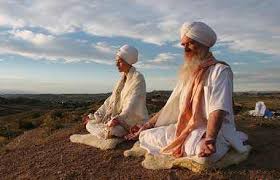INDIAN TYPES OF MEDITATION

The picture is reproduced from http://www.capertravelindia.com/uttaranchal/meditation-yoga-in-india.html
Indian meditation is much influenced by yoga practice. The aim of yoga is to achieve union with God. God or Brahman is the Ultimate Reality which underlies this apparent, ephemeral universe. God is everywhere; it is present within every sentient being as well as inanimate object. Meditation is the way to be united with God, so that the divine aspect of man is merged with the universal Reality.
The great Vedas of the Indians teach that the whole universe is a projection of God or Brahman, and that God dwells within the heart of everyone of us, and is known as Atman or the true Self. Meditation liberates the true Self so that it unites with Brahman.
The Upanishads, which are those aspects of the Vedas that deal with the knowledge of God, says
"The secret of immortality is to be found in purification of the heart, in meditation, in realization of the identity of the Self within and Brahmnan without. For immortality is union with God."
Patanjali, the Father of Yoga, described the processes leading to the union with God as dharana, dhyana and samadhi, which may be translated as concentration, meditation and enlightenment. Concentration is holding the mind within the centre of spiritual consciousness in the body, or fixing it on some divine form, either within the body or outside it.
Meditation is an uninterrupted flow of thought toward the object of concentration. As a result, the true nature of the object shines forth, undisturbed by the mind of the meditator. This is samadhi, or enlightenment. When these three -- concentration, meditation and enlightenment -- are brought about, it is called samyama, the disappearance of all distinction and differentiation with the realization of the Universal Consciousness.
Indian meditations emphasize on achieving a one-pointed mind, which is a notable contrast with the Chinese emphasis on emptiness. Nevertheless, both the Indians and the Chinese practise passive meditation; theirs is a long-term process of mind development with the ultimate aim of spiritual fulfillment, not the short-term techniques of acquiring special powers.
LINKS
